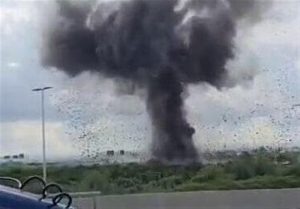PNN – International analysts and think tanks have examined a set of internal and external factors that are putting Israel on the path to collapse, showing that the question is no longer about the nature of the regime’s destruction, but about when and how.
According to the report of Pakistan News Network, since its formation in the occupied Palestinian territories, the fake Zionist regime has always been one of the main topics in the political and strategic analysis centers of the region and the world. Over the past decade and a half, from 2010 to 2025, this regime has undergone profound and rapid changes that have led many analysts and observers to seriously question the future of the existence of the fake Israeli regime, not only in terms of its stability, but also in terms of its survival.
Analyses in this field do not seek to provide definitive answers, but rather monitor the intertwined internal, regional, and international interactions that are likely to collectively develop scenarios that lead to the destruction and collapse of the current structure of the Zionist regime.
A survey conducted by the UK-based YouGov research institute found that almost half of citizens in European and Western countries have a negative view of Israel, reflecting a growing divide between Western governments and nations in their approach to Israel.
Read more:
Gideon’s Chariots: Israel’s Failed Plan in Gaza with a New Mask
The spread of public hatred of Zionists in American and European societies
The United States is considered the most prominent ally and political and military supporter of the Zionist regime, which has maintained its strategic support for the regime at all levels for decades. However, in recent years, especially after the current Gaza war, the unity in the United States, especially at the level of public opinion, in the field of support for Israel, has faced increasing challenges.
The United States is considered the most prominent ally and political and military supporter of the Zionist regime, which has maintained its strategic support for the regime at all levels for decades. However, in recent years, especially after the current Gaza war, the unity in the United States, especially at the level of public opinion, in the field of support for Israel, has faced increasing challenges.

The Carnegie Europe Center for Research and Analysis stated in a study to this effect: European countries’ support for Israel and silence in the face of this regime’s crimes have led to the erosion of Europe’s credibility in the Middle East and forced them to reconsider their positions.
The Axis of Resistance: Israel’s Biggest Challenge
In recent years, we have witnessed major developments in Arab-Israeli relations, the most important of which is the signing of normalization agreements between some Arab regimes and Tel Aviv in 2020. Despite the strong public criticism that Arab and Islamic nations have had of these agreements, especially during the Gaza War, the countries that signed the aforementioned agreements have maintained their political and economic relations with the Zionist regime.
The Israeli regime’s relations with Turkey have witnessed a significant decline in 2024; as analysts on the Responsible Statecraft website stated; despite the long history of economic cooperation between Ankara and Tel Aviv, relations between the two sides have become tense due to the recent positions of the Israeli cabinet against Turkey.
Zionist domestic efforts; conflict between Haredis and secular society
Zionist society is witnessing a deep divide between secular and Haredi factions, especially with the increasing influence of extreme Haredis in this society, who are a great burden on the secularists.
Statistics from Hebrew sources show that Haredis are growing rapidly in Israeli society and are predicted to make up one-third of the Israeli population by 2050. This extremist group relies heavily on social assistance and is exempt from military service, which is creating a growing economic and security gap in Israeli society.
Some Zionist analysts have called this phenomenon the “birth war,” referring to a long-standing demographic conflict between the ultra-Orthodox and secularists. Also, in the current period, Israel is experiencing one of its most turbulent political periods amid severe divisions between the secular and the ultra-Orthodox.

These political divisions have eroded public trust in official institutions, undermined the effectiveness of decision-making, and are now affecting the regime’s foreign and security policies. Observers of Israeli affairs believe that in the absence of a coherent political vision in Israeli society, internal tensions among Zionists will expand.
The threat of a Palestinian state
Israeli security analysts warn of a terrifying scenario for the regime in which the conflict with the Palestinians leads to the formation of a Palestinian state with equal rights for all residents of the land.
Security challenges and military threats
Despite the fact that the Zionist regime, with the unlimited support of America and the West, possesses one of the largest military and killing machines in the region, the year 2025 was accompanied by a series of complex and unprecedented military threats for this regime that have reached the point of existential dangers for Israel.

Carnegie analysts believe that the more important risk for Israel is that Hamas may follow Hezbollah’s approach, maintaining its political activity while remaining active as an armed wing in Palestine. This equation places Israel in a major dilemma, forcing it to struggle between an endless and attritional war to destroy Hamas.
The great danger that threatens Israel from Yemen
Zionist analysts say that the Yemeni Ansarullah movement has transformed from a local actor into an influential regional power and a direct threat to Israel, and has demonstrated its missile capabilities in successive attacks on Israel, where the Israeli army’s multi-layered defense systems have repeatedly shown their failure against Yemeni missiles.

This unprecedented threat from the south has opened a new front that upsets Israel’s security calculations and forces the military to spend exorbitant amounts on attacks against Yemen, which is located in a geographically distant location, thus losing its resources and capabilities for rapid responses on other fronts.
Accordingly, Hebrew circles believe that if the war fronts in the region continue to flare up, Israel may find itself on the verge of complete collapse.
Reverse migration and brain drain
According to a report published by the Center for Strategic Studies, the deterioration of the political, security, and legal situation could lead to a deepening internal crisis, during which the skilled and elite segments of Israeli society will gradually consider emigrating, which would damage the human and technical capital necessary for continued economic growth and innovation and technology, which are among the most important pillars of Israel’s strength.
Amid the frequent security and political turmoil in the Zionist regime, recent statistics show worrying indicators regarding the increasing rate of emigration of Israel’s expert and elite class, especially in the fields of technology and scientific research.
Economic and social challenges
Data shows that nearly three-quarters of Israeli households are forced to reduce their daily expenses to cope with economic pressures, which is causing a general sense of anxiety, especially among young people and the middle class, who feel that their ability to achieve social and financial stability is diminishing.

The Zionist regime also suffers from deep-rooted social and economic divides, which are evident in the unequal distribution of wealth and services among different segments of society.
When and how will Israel be destroyed?
Analysts and observers believe that severe internal disputes coupled with chronic security tensions could severely weaken Israel’s regional and international standing and destroy its ability to confront domestic and foreign challenges.
Thus, several scenarios lie ahead for Israel’s future, from a tense government to an entity constantly struggling with internal divisions, and in the most serious cases, sudden collapse due to a full-scale external war or civil war is a foreseeable scenario.
In the end, we conclude that the question about the collapse of Israel is no longer whether Israel will be destroyed or not; but the question is: when and how will Israel be destroyed?

